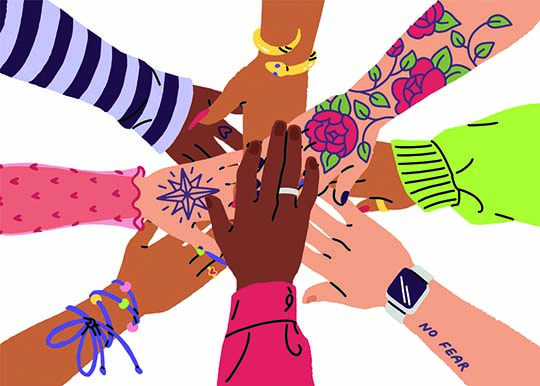Grateful. Thankful. Blessed. By Amy Tilley, PsyD, Chief Clinical Officer, Desert Star ARC We tend to hear these words frequently during the month of November: in commercials, advertisements, on...
Grateful. Thankful. Blessed.
By Amy Tilley, PsyD, Chief Clinical Officer, Desert Star ARC
We tend to hear these words frequently during the month of November: in commercials, advertisements, on social media, and in the rooms of 12 Step meetings. Gratitude is a common topic in recovery at this time of year, as we prepare for Thanksgiving and all the holiday events we get invited to. We can become inundated with these words, and become desensitized to them, especially with the business of our calendars and social obligations for the rest of the year. It is important to remember these concepts are important to our recovery and need to remain at the forefront of our daily lives. What do they all mean? The Merriam-Webster dictionary defines these three words as:
Grateful: appreciative of benefits received
Thankful: well pleased
Blessed: bringing pleasure, contentment, or good fortune.
November is National Gratitude Month
It is a relatively new concept, founded in 2015 by Stacey Grewal, who advocated for the proclamation. She formed a 30-day gratitude campaign across the world, and her vision came to life in 2015 when gratitude month was recognized in North America.
Gratitude is the quality of being thankful; readiness to show appreciation for and to return kindness. In the hustle and bustle of the last two months of the year, we can become distracted, hyper-focused, and overwhelmed by everything that “needs to be done.” We need to be aware of our thoughts and emotions, so that the “to-do list” doesn’t become a list of resentments. Resentments are the opposite of feelings of gratitude.
Resentments are….
Negative emotional reactions to an experience that we view as being unfair, one where we were mistreated. If left unattended, resentments can fester, like a splinter that you cannot get out from under your skin. Resentments can linger, and you can ruminate on them, like getting your thoughts stuck on a hamster wheel and can’t jump off.
Some people think letting go of a resentment is like waving the white flag and letting the other person win. This is not the case. We as humans all bear some resentment in life. Bearing resentments can affect your physical, mental, and emotional well-being. You may have trouble sleeping, be more stressed, have medical concerns later in life, and feel some symptoms of anxiety and depression. Bill W. wrote that resentments “destroy more alcoholics than anything else.” (As Bill Sees It, The AA Way of Life) Processing resentments are healthy and necessary to full emotional well-being. Utilize your therapist, sponsor, or 12 Step support network to help you work though any resentments you are facing. Talk to your pastor, priest, or spiritual mentor for guidance.
You may be wondering why an article about gratitude focused a bit on resentment. There is good news! You cannot be resentful and grateful at the same time! It is not possible to feel both emotions simultaneously. They are mirror opposites of each other. Kind of like trying to be angry while you are laughing…it won’t happen.
- From resentment to a practice of daily gratitude
- Surround yourself with a helpful support system.
- Make time for yourself each day. Begin with meditation and devotion time before engaging with the rest of the world.
- Begin a gratitude journal. Research shows if you write down three things that you are grateful for each day, you will experience more positivity over time. Revisit your journal and read what you wrote. You may find yourself more satisfied with the relationships that you have and the goals you accomplished.
- Share your gratitude with others. Let someone know how thankful you are for helping and being there for you. It may have a positive effect on that person.
This month, be mindful when you are grateful, thankful, and blessed. Take time to give back to your community and help others and share what you can. Here are a few examples of what you can do to spread blessings to others:
Write a handwritten letter to someone. There is something so kind about a handwritten letter that can brighten someone’s day.
Volunteer your time. Many organizations have a Thanksgiving meal for those less fortunate, and they need help to prepare for hundreds of people.
Donate gently used clothing, shoes, coats. Everyone needs a warm sweater, a coat, or a pair of gloves and a stocking cap this time of year.
One of my favorite activities is to purchase a plastic pumpkin from a craft store. Put it on your dining room table and have a permanent marker ready. At dinner, everyone goes around the table and writes one thing they are grateful for, on the pumpkin. Do this for all 30 days in November. By then end of the month, you have multiple reasons for being grateful.
Practice daily gratitude
Start small, one day at a time. Join the 30 Day Gratitude Challenge at: www.agratefulplanet.com. You may be grateful, thankful, and blessed that you did.
 Amy Tilley and has 20 years in the mental health and addiction recovery field. Her clinical interests include working with young adults and adults diagnosed with co-occurring conditions.
Amy Tilley and has 20 years in the mental health and addiction recovery field. Her clinical interests include working with young adults and adults diagnosed with co-occurring conditions.
Visit www.desertstarARC.com or call 520-638-6000

































